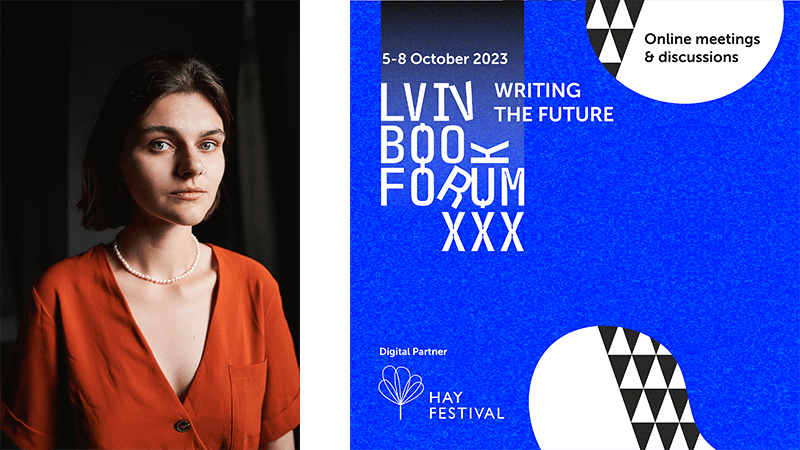Lviv Book Forum Director Sofia Cheliak On The Power Of Literature In Wartime
Sofia Cheliak can’t remember a time when she wasn’t drawn to words. Growing up in western Ukraine in the early ’00s, she learned to read before she even started elementary school, devouring books that could barely be considered for kids. Kant, Beatnik poetry and the literary classics filled her teenage years, followed by journalism – deep dives on war, Palestine and the Soviet Union.
“Literature has always been a safe space for me,” she says on a Zoom call from Lviv, a city some 70km from the border with Poland. “But also a way to cross borders and connect with people on a deeper level.”
After studying Czech at university, Cheliak went on to translate a series of poetry collections and, in 2016, work as coordinator for the Ukrainian stands at book fairs around Europe, from Vilnius to Paris. That same year, aged 19, she applied for the position of programme director of the Lviv Book Forum, Ukraine’s largest book festival. She got it.
“Getting the role was amazing,” she says. “It still is. There is so much literary talent in Ukraine, and to be part of something that helps foster it is both an honour and a dream. Our storytellers are the holders of truth, now more than even before.”
BookForum (formerly the Publishers’ Forum) has been held in Lviv each September since 1994, with the exception of 2020 due to the pandemic. It brings together Ukrainian and international journalists, historians, poets and novelists to discuss the most pressing problems in modern Ukraine and promote dialogue and cultural exchanges.
In 2021, it moved to a hybrid format with a mix of live and online talks. That same structure was adopted for the 2022 edition – this time because of Russia’s invasion of the country, on 24 February that year.
“I didn’t think we would run it,” Cheliak says. “We were living day by day, and planning a festival just seemed impossible. Then I met [Soviet-born British journalist] Peter Pomerantsev, who told me that during the Yugoslav Wars in the 1990s, people held concerts to show their support and try to stop the war. I thought, ‘Why not do the same with writers and literature?’ So, we went ahead.”
To help make it happen, Cheliak found a partner in the British Hay Festival – a digital collaboration that’s set to continue this year, which also marks Lviv BookForum’s 30th anniversary. “Events are streamed live, free to the world,” Cheliak says. “That has given us huge reach and visibility. Ukrainian writers are finally getting the attention they deserve.”
The goal, Cheliak notes, is to shed light on what’s happening in Ukraine for global audiences, while showing Ukrainians that readers across the globe stand in solidarity with them.
Organising the Forum during wartime hasn’t been easy. For the talks held in Lviv, Cheliak has had to find venues with “solid walls and large enough basements to run to, in case of missile attacks,” she tells me. Convincing sponsors and donors, too, has proved challenging, as has putting together the programme of events. Especially in light of a recent personal trauma: in July, Cheliak lost her close friend Victoria Amelina, an award-winning Ukrainian novelist, essayist and war crimes researcher, who died from injuries sustained during a Russian rocket strike on the city of Kramatorsk in eastern Ukraine.
“For a while, I was quite depressed,” Cheliak says. “My colleagues were suggesting making the future our main theme, but I just didn’t believe in it anymore. Ultimately though, giving up just didn’t feel right. If we do, then what? So, we decided to go with ‘Writing The Future’ – an ode to the power of literature to influence our lives for the better. Words really can change the world.”
That mantra has led Cheliak on to another professional endeavour centred around words: since 2020, she’s been co-hosting the show Cult Ukrainians for Ukraine Public Broadcasting Company, which covers historical events, Ukrainian culture, politics, and science.
“Besides working with books, I had this dream of becoming a journalist one day,” she says. “I am so proud and grateful to be able to do both. Education, democracy and tolerant ideas are key to keep fighting for our freedom.”
Sofia Cheliak’s 5 Ukrainian Books to Add to Your Reading List:
- The Museum Of Abandoned Secrets, by Oksana Zabuzhko, translated by Nina Murray – A multigenerational saga-meets-detective novel, spanning 60 years of Ukrainian history. At its centre: the mysterious lives of three women.
- Felix Austria by Sophia Andrukhovych, translated by Vitaly Chernetsky – The complex relationship between two women of different social status unfolds against a vividly portrayed Stanyslaviv at the turn of the twentieth century.
- Cassandra: A Dramatic Poem, by Lesia Ukrainka, translated by Nina Murray – A modern revisitation of the classic Greek myth of Cassandra, this is a sharp commentary on patriarchy and the subjugation of women.
- Writing From Ukraine. Fiction, Poetry And Essays Since 1965, edited by Mark Andryczyk – A mix of serious and funny reads by 15 contemporary Ukrainian authors, spanning the beginning of the dissident movement in Ukraine to the start of the Russian-Ukrainian war.
- Cecil The Lion Had To Die by Olena Stiazhkina, translated by Dominique Hoffmann – Stiazhkina follows the fate of four families as the Soviet Union implodes, independent Ukraine emerges, and neo-imperial Russia begins its war by occupying Ukraine’s Crimea and parts of the Donbas.
Marianna Cerini is a freelance writer for publications including Conde Nast Traveler, BBC Travel, CNN Style and Fortune




